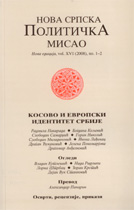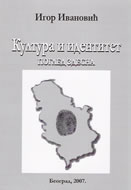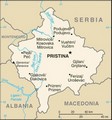| NSPM in English | |||
Unfreezing Kosovo: Reconsidering Boundaries in the Balkans |
 |
 |
 |
| среда, 28. април 2010. | |
|
(Foreign Affairs, April 26, 2010)
Two years after it declared independence, Kosovo has not progressed as many of its backers - most especially the United States - once hoped. To make Kosovo politically and economically viable, Washington should encourage negotiations open to the idea of territorial adjustment. When Kosovo unilaterally declared its independence in February 2008, proponents of the move assumed that Serbia’s acquiescence to Kosovo’s final status was not absolutely necessary. The United States and many countries in Europe hoped Kosovo would gain quick recognition. These supportive governments thought that Kosovo would then have access to capital and investment, and that the northern, ethnically Serbian parts of the province would want to take part in the post-independence economic boom. Sadly, things have not gone according to plan. Although the United States and many European countries did recognize the new state, some EU members -- such as Spain -- did not, due to fears of setting a harmful precedent that could weaken the doctrine of territorial integrity. Most other world powers have also declined to recognize an independent Kosovo, including Brazil, China, and India. Although some U.S. policymakers predicted that the Islamic world would embrace a new Muslim state -- and express gratitude to the United States for bringing about its birth -- almost no members of the Organization of the Islamic Conference have extended recognition. Even states that enjoy the patronage of the United States, such as Georgia and Iraq, have declined to support Washington by recognizing Kosovo (both countries face separatist problems of their own). Being considered nonexistent has led Kosovo to struggle economically -- a situation made even worse by the lack of a formal agreement with Serbia on property claims. As U.S. Assistant Secretary of State Philip Gordon said recently, Kosovo is hampered by “high unemployment, low investment rates, and a relatively small economic base.” The government in Pristina requires Western aid to meet its expenses. Meanwhile, Kosovo remains a regional hub for narcotics, weapons, and human trafficking, with corruption a major deterrent to foreign investment. To move forward, Washington must delink the question of independence from the question of frontiers. Initially, many hoped that growing prosperity in Kosovo would entice those living in the Serb-majority region north of the Ibar River, as well as the residents of the ethnically Serb enclaves in the south, to reconcile themselves to the reality of Kosovan independence. But the weak economy has left this promise unfulfilled. Serbian participation in the electoral process has been minimal. Even many ethnic Albanians seem to be questioning the merits of independence: whereas 93 percent of Kosovo’s Albanians believed that independence had been a good thing two years ago, that number is 75 percent today. Making matters more perilous is that, contrary to the assumptions of many proponents of independence, Belgrade has not reconciled itself to this fait accompli. Rather, it is challenging the legality of the unilateral declaration of indepedence, arguing that the rules-based international system was compromised when Kosovo’s status changed without agreement by both parties. Serbia has asked the International Court of Justice to rule that Kosovo's declaration of independence was illegal according to international law. If the ICJ rules along these lines, then Kosovo would enter a permanent state of limbo (the court's decision is expected later this year). In such a scenario, Kosovo would not be able to join international bodies such as the UN, and its relationship with the EU would remain unsettled. Some countries may withdraw their recognition, as well. But the ICJ process also creates a pretext for renewed negotiations that might break the existing deadlock. In pushing for talks, the United States and Europe must contend with two realities. First, the government in Pristina is not going to withdraw its declaration of independence, nor are states that have already recognized Kosovo -- beginning with the United States -- prepared to rescind their recognitions. Second, no government in Belgrade will recognize the current boundaries of Kosovo as legitimate. And in the aftermath of the 2004 riots, in which mobs attacked Serbian communities and churches, no Serbian administration can trust that ethnic Serbs and Serbian heritage sites will be safe in an independent Kosovo. To convince Belgrade otherwise would require outside security guarantees, but NATO is not prepared to make an open-ended commitment to deploying forces in Kosovo. Whatever the outcome, Belgrade would benefit from resolving Kosovo’s status. Serbia’s relations with all of its neighbors -- and its position as the linchpin state of the western Balkans -- are complicated by the lingering Kosovo question. Its domestic politics are also negatively affected, as nationalists are able to attack pro-reform and pro-Western parties by championing the “fate of Kosovo.” Moreover, the U.S. strategy of compartmentalization -- whereby Kosovo is treated as an issue separate from the rest of the U.S.-Serbian relationship -- is not viable. The Obama administration cannot deepen cooperation with Serbia in order to stabilize the western Balkans yet “agree to disagree” on Kosovo. To move forward, Washington must delink the question of independence from the question of frontiers. In other words, the debate over whether there should be an independent, Albanian-majority state of Kosovo must be handled separately from territorial issues. There are precedents for this approach: after World War I, the international community recognized that there would be an independent Armenia and Poland before the boundaries were definitely created; today, the Israel-Palestinian peace process works from a starting point of a two-state solution, although no final territorial settlement has been made. And yet, ever since the failed Rambouillet peace talks in 1999, diplomats have made the mistake of insisting that an independent Kosovo cover the entirety of the province as defined by the communist strongman Josip Broz Tito. Belgrade and Pristina may come to an eventual agreement if the question of boundaries is split from the theoretical question of independence. Such talks should proceed without preconditions. This means that Serbia should not be required to change its constitution to cede legal and territorial claims to Kosovo (just as Ireland held on to its constitutional claims to the north of the island until 1998 without precluding talks with the United Kingdom). Nor should the government in Pristina be forced to abandon its earlier declarations. Territorial adjustment, however, should certainly be on the table. The broad outline of a settlement is already clear: the Serb-majority regions north of the Ibar should remain part of Serbia, with some sort of arrangement made for important Serbian heritage sites and enclaves in the south. One possible model for the latter is the agreement reached between Italy and the Vatican in 1929. For decades, the Catholic Church had not recognized the takeover of Rome by Italy in 1870; the Italian state was similarly uninclined to cede its claim over its capital city. The Lateran Treaty resolved this issue by establishing Vatican City as a neutral but independent state. Additionally, the Vatican received extraterritorial rights over sacred sites in and around Rome and in other parts of Italy. Of course, the Kosovo case is not identical, but the Lateran model could provide guidelines for a sustainable settlement. An agreement between Belgrade and Pristina would resolve Kosovo’s state of limbo in the international community. It would simultaneously settle the critical issue that has slowed Serbia’s integration with Europe: Belgrade's ability to show that it controls all the territory under its jurisdiction, a requirement if it is to ensure enforcement of the acquis communautaire, the EU's body of common law. An agreement would also lift the current barriers to Kosovo's membership in the UN, signaling a final resolution to the issue. Critics of such a plan would suggest that the very idea of redrawing boundaries is dangerous because it could call into question other disputed borders in the Balkans. But the reality on the ground is that Pristina has never controlled the territories north of the Ibar. And as shown by the continued need for NATO troops to protect Serb enclaves and monasteries in the south, Pristina does not really control those areas either. Would NATO member states launch a military campaign to conquer Mitrovica and the north in order to forcibly bring them under Pristina’s governance? Some critics might also argue that adjusting Kosovo's boundaries would compromise its status as a viable state. Yet Kosovo is far less viable in its current condition. Moreover, if outstanding property disputes and border issues are resolved, international investors would feel more secure investing in Kosovo. Economic development, in turn, would have a positive effect on security and long-term stability. And adjusting territorial boundaries would not necessarly spark new instability, because any agreement would respect the principles of the 1975 Helsinki accords by being voluntary and negotiated, not a forcible change imposed by one party on another. Nikolas K. Gvosdev is Professor of National Security Studies at the U.S. Naval War College. The views expressed here are entirely his own. http://www.foreignaffairs.com/articles/66392/nikolas-k-gvosdev/unfreezing-kosovo |
Остали чланци у рубрици
- Playing With Fire in Ukraine
- Kosovo as a res extra commercium and the alchemy of colonization
- The Balkans XX years after NATO aggression: the case of the Republic of Srpska – past, present and future
- Из архиве - Remarks Before the Foreign Affairs Committee of the European Parliament
- Dysfunction in the Balkans - Can the Post-Yugoslav Settlement Survive?
- Serbia’s latest would-be savior is a modernizer, a strongman - or both
- Why the Ukraine Crisis Is the West’s Fault
- The Ghosts of World War I Circle over Ukraine
- Nato's action plan in Ukraine is right out of Dr Strangelove
- Why Yanukovych Said No to Europe

.jpg)








 Summary:
Summary:













